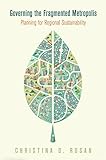Governing the Fragmented Metropolis : Planning for Regional Sustainability / Christina D. Rosan.
Material type: TextSeries: The City in the Twenty-First CenturyPublisher: Philadelphia : University of Pennsylvania Press, [2016]Copyright date: ©2017Description: 1 online resource (248 p.) : 5 illusContent type:
TextSeries: The City in the Twenty-First CenturyPublisher: Philadelphia : University of Pennsylvania Press, [2016]Copyright date: ©2017Description: 1 online resource (248 p.) : 5 illusContent type: - 9780812248555
- 9780812293258
- City planning -- Environmental aspects -- United States
- City planning -- United States -- Case studies
- Metropolitan areas -- United States
- Metropolitan government -- United States
- Regional planning -- Environmental aspects -- United States
- Regional planning -- United States -- Case studies
- Sustainable urban development -- United States
- POLITICAL SCIENCE / Public Policy / Regional Planning
- Political Science
- Public Policy
- Urban Studies
- 307.1/216073 23
- HT334.U5 R665 2016eb
- online - DeGruyter
- Issued also in print.
| Item type | Current library | Call number | URL | Status | Notes | Barcode | |
|---|---|---|---|---|---|---|---|
 eBook
eBook
|
Biblioteca "Angelicum" Pont. Univ. S.Tommaso d'Aquino Nuvola online | online - DeGruyter (Browse shelf(Opens below)) | Online access | Not for loan (Accesso limitato) | Accesso per gli utenti autorizzati / Access for authorized users | (dgr)9780812293258 |
Browsing Biblioteca "Angelicum" Pont. Univ. S.Tommaso d'Aquino shelves, Shelving location: Nuvola online Close shelf browser (Hides shelf browser)

|

|

|

|

|

|

|
||
| online - DeGruyter Our Emily Dickinsons : American Women Poets and the Intimacies of Difference / | online - DeGruyter In the Heat of the Summer : The New York Riots of 1964 and the War on Crime / | online - DeGruyter Armies and Insurgencies in the Arab Spring / | online - DeGruyter Governing the Fragmented Metropolis : Planning for Regional Sustainability / | online - DeGruyter A Historian in Exile : Solomon ibn Verga, "Shevet Yehudah," and the Jewish-Christian Encounter / | online - DeGruyter The Great War and American Foreign Policy, 1914-24 / | online - DeGruyter Benevolent Empire : U.S. Power, Humanitarianism, and the World's Dispossessed / |
Frontmatter -- Contents -- List of Abbreviations -- Chapter 1. Planning for a Metropolitan Future -- Chapter 2. Planning Without Authority in Boston -- Chapter 3. Becoming a Regional Player in Denver -- Chapter 4. A Nested System in Transition in Portland -- Chapter 5. Lessons for Metropolitan Planning -- Chapter 6. Governing More Effective Regions -- Notes -- Bibliography -- Index -- Acknowledgments
restricted access online access with authorization star
http://purl.org/coar/access_right/c_16ec
Today the challenges facing our nation's metropolitan regions are enormous: demographic change, aging infrastructure, climate change mitigation and adaptation, urban sprawl, spatial segregation, gentrification, education, housing affordability, regional equity, and more. Unfortunately, local governments do not have the capacity to respond to the interlocking set of problems facing metropolitan regions, and future challenges such as population growth and climate change will not make it easier. But will we ever have a more effective and sustainable approach to developing the metropolitan region? The answer may depend on our ability to develop a means to govern a metropolitan region that promotes population density, regional public transit systems, and the equitable development of city and suburbs within a system of land use and planning that is by and large a local one. If we want to plan for sustainable regions we need to understand and strengthen existing metropolitan planning arrangements. Christina D. Rosan observes that policy-makers and scholars have long agreed that we need metropolitan governance, but they have debated the best approach. She argues that we need to have a more nuanced understanding of both metropolitan development and local land use planning. She interviews over ninety local and regional policy-makers in Portland, Denver, and Boston, and compares the uses of collaboration and authority in their varying metropolitan planning processes. At one end of the spectrum is Portland's approach, which leverages its authority and mandates local land use; at the other end is Boston's, which offers capacity building and financial incentives in the hopes of garnering voluntary cooperation. Rosan contends that most regions lie somewhere in between and only by understanding our current hybrid system of local land use planning and metropolitan governance will we be able to think critically about what political arrangements and tools are necessary to support the development of environmentally, economically, and socially sustainable metropolitan regions.
Issued also in print.
Mode of access: Internet via World Wide Web.
In English.
Description based on online resource; title from PDF title page (publisher's Web site, viewed 30. Aug 2021)


